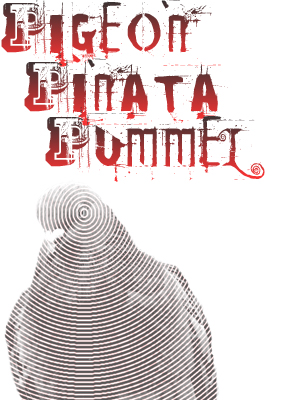|
|
|
Come Out & Play 2008 in New York
Earn rewards of candy as you vent stress with a wiffleball bat!
Start Time: Sunday June 8 at 2 PM Pigeon Piñatas and their cronies are taking over the city and it’s your responsibility to rid our fair city of this nuisance. Team up with your friends and grab some wiffleball bats to pummel the piñatas to oblivion. You'll be bestowed with power-ups, self-satisfaction and sweet, sweet candy. We regret that no actual pigeons will be harmed in this game, but plenty of piñatas will be massacred!
The Rules
Teams
Core Gameplay The piñatas are filled with candy, upgrade tokens (poker chips with the name of the upgrade written on them), money (ping pong balls), and points (bouncy balls). After he hits the piñata, the player who is "at bat", and any players in line may run to grab anything that comes out of the piñata. If a player leaves the line, they must return to the end of the line. The candy is just for fun and players can eat it.
Upgrades Teams can buy the following upgrades with ping pong balls, to be distributed among their team however they’d like: Weapon Upgrade token: 1 ball (allows use of a bigger, heavier bat) 2 hits token: 2 balls (allows player to swing twice) Sighted token: 3 ball (allows player to swing without a blindfold)
Winning
Strategy
Bio: Nik Mikros In 1997, he joined with John Mikros to found Flying Mikros Interactive, creators of eccentric and eclectic electronic entertainment for the Internet, PC and Mac platforms. One of their PC titles "The Egg Files," was selected as one of ten finalists in the 2002 Independent Games Festival. After his time with John, he became a partner at Black Hammer Game, inc. where he served as creative director and lead game designer for "Supremacy: Four Paths to Power" a 3D strategy game for the PC platform published by Matrix Games. Supremacy was chosen as a finalist in the 2005 Independent Games Festival. Before that he was technical director for "I-SPY Challenger" a Game Boy Advance title published by Scholastic. Fast forward to the present. Nik currently runs "Tiny Mantis Entertainment" a unique game development firm in the heart of Chinatown, New York City. He received his MFA in Computer Art from the School of Visual Arts in 1993, and a BA in Fine Art from Queens College in 1989. Nik has taught various game design, multimedia and programming classes at the MFA Computer Art Department at SVA for the past 9 years. He has also taught at Sarah Lawrence College, Seton Hall University, and Harvestworks.
Bio: Joshua DeBonis Joshua organizes the NYC board game designers playtest group, a monthly meeting which facilitates playtesting of board games and receiving critical feedback from other designers. Joshua has a BA in Jazz Performance from Western Connecticut State University. He is a jazz saxophonist and underground hip hop MC. |

|